Experiential learning is an essential part of a liberal arts education, and Austin native Megan Nater’s time studying abroad has served her well.
Nater is an International Relations & Global Studies senior whose studies focus on security and Latin America. For her undergraduate honors thesis, Nater is examining women’s rights mobilization in Colombia.
As a UT Austin student, Nater has studied abroad in Havana, Cuba (May-July 2016, Casa de las Americas), Lima, Peru (fall 2016, Pontificia Universidad Católica del Perú), and Santiago, Chile (spring 2017, Pontificia Universidad Católica de Chile).
She also received a Marion Burke Smith Research Scholarship from the Liberal Arts Honors program to help support her thesis research. In January, Nater traveled to Bogotá and Cartagena, Colombia, for 12 days to conduct in-person interviews.
Read about Nater’s research into women’s rights and how her experiences studying abroad have shaped her education in the Q&A below.
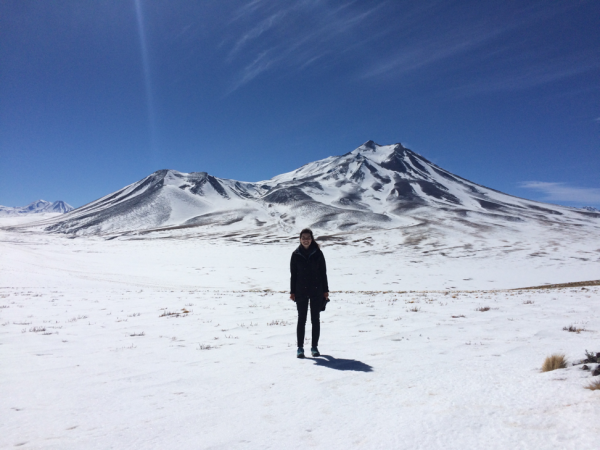
What were your experiences abroad like?
That is a big question. I had so many incredible experiences abroad and they were all so different. I will say that I loved living in Latin America. It was a blast to navigate the cities. It was also so much fun to speak Spanish. My friends and I would try to chat with as many people as we could. People were so receptive and open—especially in Cuba. It was so energizing to be there. As a summary of all my experiences, you could say that my experiences abroad in general really filled me up.
How did the culture differ?
Each place was so different. Santiago, [Chile] I would say felt a little bit like the culture of the Northeast in the U.S. It was a big city, so people were always on the go, but I’d also say they were a little more reserved at first when meeting strangers. Cuba was the opposite. Everyone was open to talk. People were generally interested in hearing about your life and sharing their experiences. That was my favorite part about Cuba—all the small conversations and moments of just being with people. Peru was somewhat of an in-between.
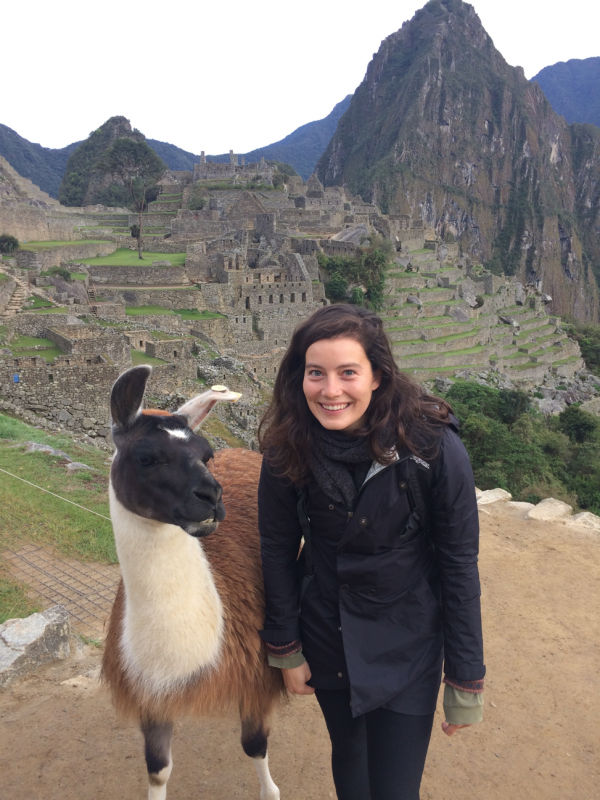
What was your favorite moment of your time abroad?
That is a really hard question. I don’t think I have a favorite moment but one that has stayed with me was from my trip to the Amazon in Peru. I stayed in a small hut far out in the rainforest. We took a three-hour bus ride and a two-hour boat ride to get to our lodging.
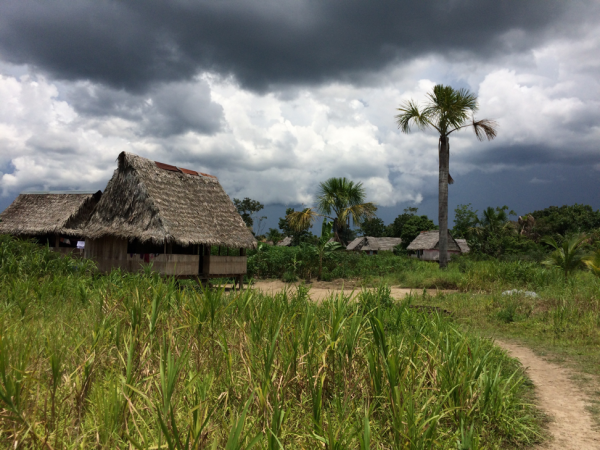
At night, I walked out into the rainforest a little ways on my own to a big clearing to see the stars. It was incredible. I had never seen a sky like that. That was a beautiful moment because I was overwhelmed by how lucky I was to be there. Who would have ever thought that I would be standing in the Amazon rainforest so far from my home but at the same time so content and at peace? Studying abroad brings a lot of small but powerful moments like that—especially if you choose to go off the normal path and are considerate of where you are.
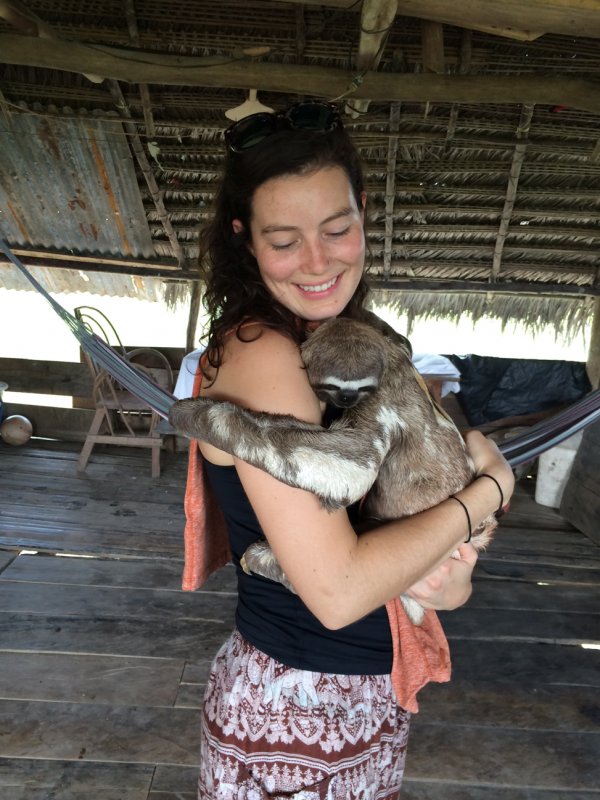
How did your experiences abroad change your outlook?
In terms of my studies abroad, it was really interesting to learn the same themes, but from another perspective. It was a good learning experience to see how the U.S. is perceived. I would like to work in or with Latin America at some point and understanding the U.S. perception is a valuable perspective to have.
What advice would you give to other students who are considering studying abroad?
Do it. You should not miss out on going abroad. Each person has something substantial to gain from living in another country. The benefit may differ slightly on the person depending on where they are in their lives and what they are looking for, but regardless of differing experiences, living abroad teaches you so much.
In terms of advice, I’d say really reflect on what you are wanting out of your abroad experience and do research before choosing a place. With that being said, no matter how much research you do, there is no way to anticipate exactly what your experience will be like. You have to go into studying abroad with an open mind and with excitement for the unexpected in order to get the most out of the experience.
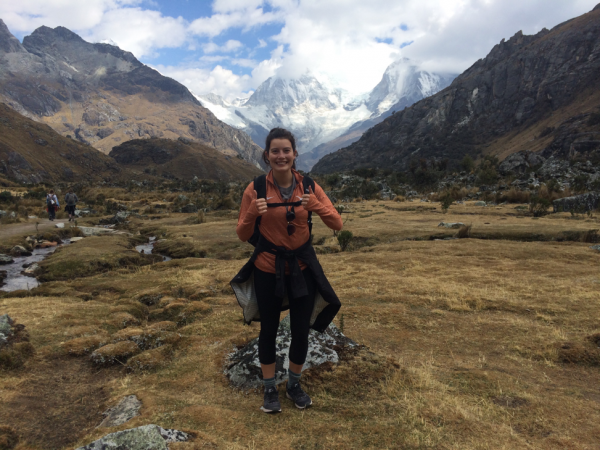
How has the Marion Burke Smith Research Scholarship aided you?
The Marion Burke Smith Research Scholarship funded my trip to Colombia. It would not have been possible to go to Colombia without this funding and I would not have had the opportunity to speak firsthand with women working in rights implementation. I gained valuable information that I could never have found in books or articles. This information will make my thesis more relevant and, hopefully, impactful. I am incredibly grateful to have received this scholarship and am so proud to attend a university that supports its student to go above and beyond in their education.
Can you describe your research on Women’s Rights Mobilization in Colombia?
My goal is to understand how to effectively implement women’s rights so that women may truly enjoy the right to a life free from violence. Violence against women is an issue that is prevalent in all societies. So figuring out how to ensure the right to a life free from violence is crucial and this guarantee comes when rights are actually implemented.
My research looks at the various factors that lead to implementation including education, access to resources, government response, societal responses, etc. I hope that by seeing which factors are necessary to implement rights, we can see where the gaps are and understand how to address these gaps.
How did you decide on your topic?
During my time abroad, I witnessed gender-based violence on various occasions. I had been pretty sheltered beforehand in terms of exposure to violence. It was very shocking and unsettling to see. These events caused me to reflect on gender dynamics globally, especially in the U.S., and to reinterpret some experiences I’ve had. So from that point, I knew I wanted to focus my thesis on gender relations and violence against women. It needs to be talked about.
The reason I chose Colombia is because I love the country. It is my favorite place I’ve been—with Cuba being a close second. The people are so kind and open. There is a love for life there that I haven’t quite seen in other places. Yet, at the same time, they have a painful and violent history that is very recent. Although the peace agreement is underway, there is still a lot to be done to reconcile the violence people, especially women, faced in the conflict. Women faced a two-sided violence—violence from the conflict and violence from “normal gender dynamics.” For this reason, it is a really interesting place and context to be looking at violence and the violence directed at women.
How are you conducting your research?
My research in Colombia is based off of interviews. I am trying to figure out what factors are necessary to ensure the protection of women’s rights. Through literature and reports, I have seen that Colombia has incredible laws, but there is a major gap between laws on paper and implementation.
I asked questions getting at the causes of this gap. I talked to people in the UN Mission and the UN High Commissioner for Refugees. I also met with various Colombian NGOs working on women’s rights and equality. In Cartagena, I had the privilege of meeting with amazing women who started their own organizations in their small towns and learned about the challenges that they face at the grassroots level. It was really wonderful to hear people’s perspectives at different levels of society. It showed me how someone’s societal position influences the way they see the same situation.
What element of your research do you find most fascinating?
Something that really struck me from my research in Colombia was the importance of education. It wasn’t so much systematic education, such as formal schooling, although that is important; but education on “rights” and the resources available to an individual. This type of education is generally done through programs and work of NGOs. The legal system is so complicated that it is often hard to understand. Teaching people about their rights and the systems in place to protect them is crucial.
However, I also learned that the way it is taught is a factor that can make or break the impact of education. You must really understand the social dynamics and the networks a person is surrounded by in order to find the best approach to teach them what “rights” mean and how to navigate claiming them. If you don’t approach the situation with knowledge and care, efforts may be wasted because they will not be understood or well received.
I saw this dynamic play out when NGOs would try to translate international education agendas and programs to the grassroots level in Colombia. It can be a tricky relationship, but one that is important to understand in order to guarantee women’s rights at every level of society.
Has this project impacted what you want to do after graduation?
Absolutely. I know that I want to be working to help ensure people’s rights are accessible and respected. My project has showed me how difficult that can be. There are so many factors that go into making rights “accessible,” something that I think a lot of people, myself included, can take for granted.
I just started an internship with a legal NGO called RAICES. It works with refugees and immigrants seeking asylum in the U.S. The main issue I will be working on is protecting the rights of unaccompanied minors who are sent to the U.S. for various reasons, some being to avoid violence and sexual exploitation. I hope to continue doing this line of work after I graduate. In order to do that, I will need to attend law school, which is a plan for the near future.
To learn more about studying abroad as a liberal arts student, visit Liberal Arts Frontiers.
